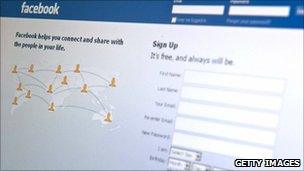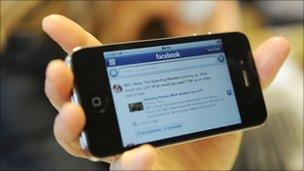Facebook unveils 'groups' feature and user controls
- Published

There are yet more new features being added to the updated Facebook
Facebook has introduced a raft of features aimed at giving users more control over their personal data.
A groups feature will allow users to specify circles of friends with whom they want to share different data.
For the first time, users will also be able to download all the data they have uploaded onto the site.
They will also find it easier to see how individual applications are using personal information, Facebook's chief executive Mark Zuckerberg said.
"The changes today are about giving people more control over how they share in a lot of different contexts," Mr Zuckerberg told BBC News.
"One of the things we have heard is that people just want to share information with smaller groups of people.
"It will enable people to share things that they wouldn't have wanted to share with all of their friends."
He added: "There are some things you are comfortable saying to all your friends at once but a lot of things you only want to share with your close co-workers or your family and there just hasn't been a great way to do that until now."
Behaviour change
The groups feature will allow users form online havens around a discreet circle of people just as they do in the real world.
Members will then be able to share information with people specific to that group.
A list feature on Facebook already lets users create subsets of their friends but Mr Zuckerberg said that only about 5% of its 500 million users use it.
"Groups will change behaviour," Augie Ray a senior analyst with research firm Forrester told BBC News.
"It's possible that people will join Facebook because they will feel they can control who sees their information. I am a very open person and blast everything I say on Twitter or Facebook but now something like this will allow people to think more deeply about who will see what they say, and will increase engagement."
Another analyst Ray Valdes of Gartner called groups "a major milestone in a very long road that represents part of the ongoing evolution of our social connections".
'False security'
Facebook said its engineers had been in lockdown for the past 60 days working on these new products.
One of the new tools called "Download Your Information" is designed to enable users to download everything they have ever posted to the site, such as photos, status updates and wall posts.
The tool is a major departure for Facebook, which has come under criticism in the past for not allowing users access to their own data.
This effectively locked Facebook users into the site, unable to port their data to other sites.

Mark Zuckerberg unveiled Facebook's latest features at the company's California headquarters
"All the information that is on Facebook comes from people sharing it," said Mr Zuckerberg.
"It is not our information. It is people's information. We just have this strong philosophical belief that people own that information and they should be able set exactly who can see it, move it to different applications and use it how they want. They should be able to take it away if they want."
The groups feature is the one the company touted most heavily and one that Mr Zuckerberg seemed most proud of.
"We think that what we have out of the box, version one, blows away everything else," he said, referring to "groups" services offered by internet stalwarts such as Yahoo! and Google.
Privacy has been a constant thorn for the world's biggest social network whenever it introduces new products or changes settings on the site.
"Mostly I am happy they are giving users more control and I think the groups aspect for the most part does give you this added control," said Larry Magid, co-director of ConnectSafely.org.
Phone sync worries
"The only worry I have is that friends can add people to the group, so if you create a group and are in a group you have to be aware of not only who you add but who others add.
"As long as you are aware of who is in the group it can be a great privacy tool. If it gets out of hand it could give you a sense of false security."

There has been concern over syncing phone contacts with Facebook
The roll out of new products comes amid reports that a syncing feature on the iPhone lets Facebook access contact data and share it on the site.
"It's very possible that your private phone numbers - and those of lots of your and their friends - are on the site," said Charles Arthur of the Guardian newspaper, external.
Another tech blogger, Kurt van Moos, who was the first to warn about this feature in January, outlined his concerns.
"Phone numbers are private and valuable. Most people who have entrusted you with their phone numbers assume you will keep them private and safe," he said.
In a statement to the BBC, Facebook confirmed that the site allowed them to sync their friends' contact information.
"The ability to sync their contacts is used for the purpose of connecting [users] with their friends," it said.
"All of this information is private and is not shared with any friends or any third party.
"Even if someone wanted to, they could not share any of this information with other friends, for example."
Facebook added that users could easily delete contacts copied over from their phones.
- Published22 September 2010
- Published17 September 2010
- Published21 July 2010
- Published21 May 2010
- Published30 September 2010